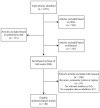The bidirectional relationship between periodontal disease and pregnancy via the interaction of oral microorganisms, hormone and immune response
- PMID: 36778874
- PMCID: PMC9908602
- DOI: 10.3389/fmicb.2023.1070917
The bidirectional relationship between periodontal disease and pregnancy via the interaction of oral microorganisms, hormone and immune response
Abstract
Periodontal disease has been suggested to be linked to adverse pregnancy outcomes such as preterm birth, low birth weight, and preeclampsia. Adverse pregnancy outcomes are a significant public health issue with important clinical and societal repercussions. This article systematically reviews the available epidemiological studies involving the relationship between periodontal disease and adverse pregnancy outcomes over the past 15 years, and finds a weak but independent association between adverse pregnancy outcomes and periodontal disease. The bidirectional association and the potential mechanisms are then explored, focusing on three possible mechanisms: inflammatory reaction, oral microorganisms and immune response. Specifically, elevated systemic inflammation and increased periodontal pathogens with their toxic products, along with a relatively suppressed immune system may lead to the disruption of homeostasis within fetal-placental unit and thus induce adverse pregnancy outcomes. This review also explains the possible mechanisms around why women are more susceptible to periodontal disease. In conclusion, pregnant women are more likely to develop periodontal disease due to hormonal changes, and periodontal disease has also been suspected to increase the incidence of adverse pregnancy outcomes. Therefore, in order to lessen the risk of adverse pregnancy outcomes, both obstetricians and dentists should pay attention to the development of periodontal diseases among women during pregnancy.
Keywords: adverse pregnancy; immune response; inflammation; periodontal diseases; periodontal pathogens.
Copyright © 2023 Wen, Fu, Zhao, Yang and Huang.
Conflict of interest statement
The authors declare that the research was conducted in the absence of any commercial or financial relationships that could be construed as a potential conflict of interest.
Figures
Similar articles
-
[The association between maternal periodontal health and adverse pregnancy outcomes].Orv Hetil. 2018 Jun;159(25):999-1007. doi: 10.1556/650.2018.31120. Orv Hetil. 2018. PMID: 29909659 Hungarian.
-
Periodontal Pathogens and Adverse Pregnancy Outcomes: A Narrative Review.Life (Basel). 2023 Jul 13;13(7):1559. doi: 10.3390/life13071559. Life (Basel). 2023. PMID: 37511934 Free PMC article. Review.
-
The oral microbiome and adverse pregnancy outcomes.Int J Womens Health. 2017 Aug 8;9:551-559. doi: 10.2147/IJWH.S142730. eCollection 2017. Int J Womens Health. 2017. PMID: 28848365 Free PMC article. Review.
-
Periodontal disease and adverse pregnancy outcomes.Periodontol 2000. 2020 Jun;83(1):154-174. doi: 10.1111/prd.12294. Periodontol 2000. 2020. PMID: 32385871 Review.
-
Choosing the left fork: Steven Offenbacher and understanding maternal periodontal disease and adverse pregnancy outcomes.J Periodontol. 2020 Oct;91 Suppl 1:S40-S44. doi: 10.1002/JPER.20-0090. Epub 2020 Aug 18. J Periodontol. 2020. PMID: 32614074
Cited by
-
Association Between Periodontitis and Preeclampsia: A Bidirectional Mendelian Randomisation Analysis.Int Dent J. 2024 Dec;74(6):1438-1446. doi: 10.1016/j.identj.2024.05.004. Epub 2024 Jun 8. Int Dent J. 2024. PMID: 38853053 Free PMC article.
-
Oral health-related beliefs among a sample of pregnant women in Southwestern Ontario: a descriptive study.Front Oral Health. 2024 Oct 23;5:1485815. doi: 10.3389/froh.2024.1485815. eCollection 2024. Front Oral Health. 2024. PMID: 39507543 Free PMC article.
-
Oral Health, Anxiety, Depression, and Stress in Pregnancy: A Rapid Review of Associations and Implications for Perinatal Care.Int J Environ Res Public Health. 2024 Dec 29;22(1):32. doi: 10.3390/ijerph22010032. Int J Environ Res Public Health. 2024. PMID: 39857485 Free PMC article.
-
The NFκB Signaling Pathway Is Involved in the Pathophysiological Process of Preeclampsia.Geburtshilfe Frauenheilkd. 2024 Apr 10;84(4):334-345. doi: 10.1055/a-2273-6318. eCollection 2024 Apr. Geburtshilfe Frauenheilkd. 2024. PMID: 38618576 Free PMC article.
-
Obesity and periodontitis: a comprehensive review of their interconnected pathophysiology and clinical implications.Front Nutr. 2024 Aug 7;11:1440216. doi: 10.3389/fnut.2024.1440216. eCollection 2024. Front Nutr. 2024. PMID: 39171112 Free PMC article. Review.
References
-
- Alchalabi H. A., Al Habashneh R., Jabali O. A., Khader Y. S. (2013). Association between periodontal disease and adverse pregnancy outcomes in a cohort of pregnant women in Jordan. Clin. Exp. Obstet. Gynecol. 40, 399–402. - PubMed
-
- Andonova I., Iliev V. (2021). Oral anaerobic microflora and pregnancy complication. Open Access Maced. J. Med. Sci. 9, 1681–1685. doi: 10.3889/oamjms.2021.7601 - DOI
Publication types
LinkOut - more resources
Full Text Sources
Miscellaneous



